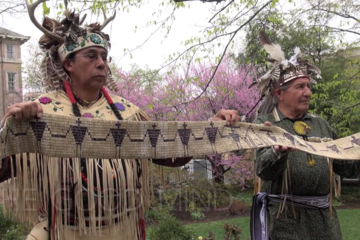
10/24/2017
Freida Jacques, a respected clan mother from the nearby Onondaga Nation, will introduce an award-winning documentary about the political struggles of her people on Nov. 7, launching the first of three films that will screen at SUNY Cortland during National American Indian Heritage Month.
“The Good Mind,” which Jacques participated in, follows members of Onondaga Nation as they try to continue the ways of their ancestors and protect their sovereignty and culture. The Onondagas, whose territory lies less than half an hour’s drive north of Cortland, are advocates for the environment and are engaged in a legal battle over ancestral lands awarded in a treaty with George Washington.
“It’s important to keep the campus and community informed about Onondaga because they’re our immediate neighbors,” said Dawn Van Hall, a retired technology support specialist who helped co-create the Native American Studies minor with Ellis McDowell-Loudan, professor of sociology/anthropology, more than 20 years ago.
All three movies in SUNY Cortland’s Fall 2017 Native American Film Series
highlight the importance of indigenous contributions to culture, music, food and history that often are overlooked. These three films explore modern issues facing traditional societies like the Onondaga Nation, Native American influences in modern music, and the story of the first Native American woman to earn a medical degree.
The films, all free and open to the public, will be shown on three separate Tuesdays at 7 p.m. in Sperry Center, Room 106.
“The Good Mind,” which comes from a translation of the word for the Onondagas’ philosophy and way of life, has been shown at numerous festivals and won several awards, including the Syracuse International Film Festival’s Audience Choice Award and the Social Justice Film Festival’s Silver Jury Prize. It also won Best Documentary Feature Film Audience Choice Award from One Nation Film Festival.
“Rumble: Indians Who Rocked the World” will be shown on Nov. 14. The documentary explores the profound influence of indigenous people on American music. The film focuses on music icons with Native American ancestors such Jimi Hendrix, Link Wray, Buffy Sainte-Marie and Randy Castillo. The stories of these musicians are told by legends who played and were inspired by them such as Quincy Jones, Tony Bennett, Iggy Pop and Steven Tyler.
“Rumble” was directed by Catherine Bainbridge and Alfonso Maiana and has won many awards, including Sundance’s World Cinema Documentary Special Jury Award and the Albuquerque Film and Music Best Documentary Award.
“Medicine Woman,” the final film in the series, will be shown on Nov. 28. It tells the story of Susan La Flesche Picotte, who graduated from the Woman’s Medical College of Pennsylvania in 1889 and was the first Native American woman to earn a medical degree. The film also looks at the medical needs of the Rosebud Sioux Reservation in modern-day South Dakota and explains how Picotte’s legacy survives.
“Native Americans are still alive and thriving,” Van Hall said. “They’re not the Hollywood versions you see. They don’t live in teepees and they’re not mascots. I hope the films give people more background about Native Americans and their culture.”
The series is sponsored by SUNY Cortland’s Native American Studies Department, a grant from the Auxiliary Services Corporation, the Provost and Vice President for Academic Affairs’ Office and the Center for Gender and Intercultural Studies.
For more information, contact Van Hall.
Prepared by Communications Office writing intern McKenzie Henry